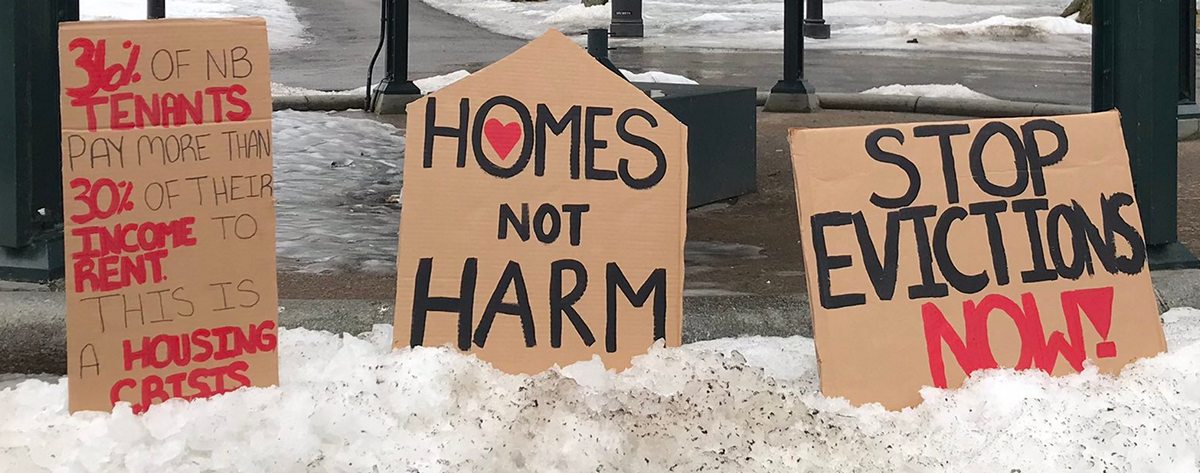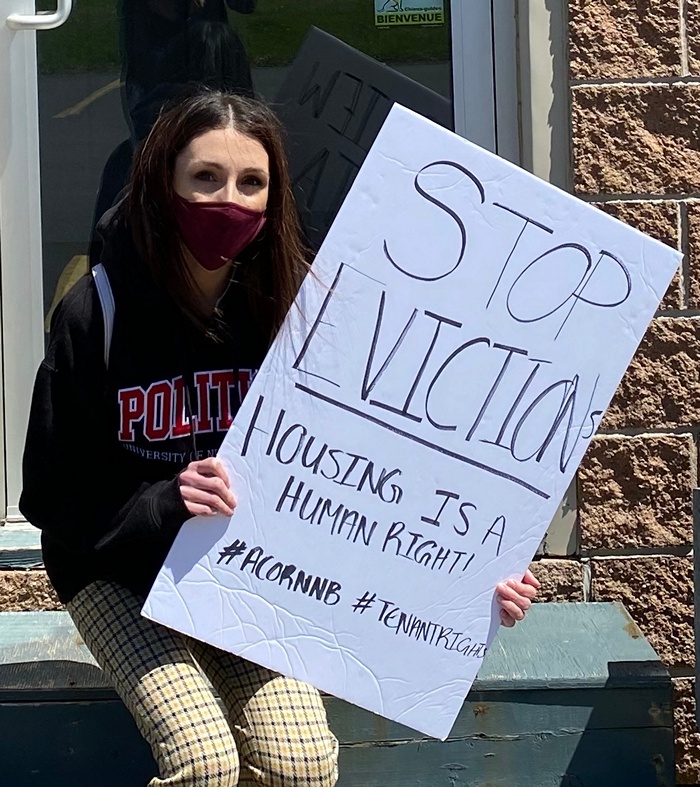In the News
Worsening Housing Crisis in New Brunswick
Defend Tenants’ Rights!

New Brunswick action for right to housing, March 11, 2021
Aditya Rao is an organizer with the New Brunswick Coalition for Tenants’ Rights
Workers’ Forum: Unions and advocates for housing as a right are talking about the worsening of the housing crisis in New Brunswick. Can you tell us more about it?
Aditya Rao: In New Brunswick, predatory investors and real estate investment trusts that have no interest whatsoever in affordability have been able to run completely amok in a market that is entirely unregulated. According to a researcher from Ontario who is studying real estate investment trusts, New Brunswick has some of the highest rates of real estate investment activity in the country. Part of the reason is that there are very few protections for tenants in New Brunswick. There is a direct correlation between weak tenant protections and high speculative and predatory investor activities. Entities that have no interest in affordability want only to gamble with housing, which should be recognized as a human right but instead is a vehicle for maximization of shareholder returns. Their only interest is in extracting as much profit as they can from these properties.
We are hearing of numbered companies from Ontario or Quebec buying up properties in New Brunswick and then selling them right away at a profit and driving up costs for everybody as a result. That is happening at the expense of Newbrunswickers who cannot afford to rent a home, let alone buy a home. The government here has the opportunity to stop what is happening but is deliberately choosing not to. We are seeing what that does and that should be a lesson to governments and activists and advocates across the country and the world, really.
WF: What are some of the features of this crisis in terms of the situation tenants are facing?
 AR: Tenants in New Brunswick have some of the fewest protections compared to tenants almost anywhere else in the country. It is completely lawful for a landlord to refuse, for absolutely no reason, to renew a lease agreement at the end of the lease agreement’s life. In other parts of the country, there is something called ‘security of tenure.’ The idea is that you as a tenant should be able to live in security with the knowledge that you will have a place to live, that at the end of the lease agreement it will automatically be renewed, you will have a place to live and you cannot be arbitrarily removed from your home. In New Brunswick, it is entirely lawful to arbitrarily end a lease agreement and therefore arbitrarily evict New Brunswickers from their homes and it happens very often.
AR: Tenants in New Brunswick have some of the fewest protections compared to tenants almost anywhere else in the country. It is completely lawful for a landlord to refuse, for absolutely no reason, to renew a lease agreement at the end of the lease agreement’s life. In other parts of the country, there is something called ‘security of tenure.’ The idea is that you as a tenant should be able to live in security with the knowledge that you will have a place to live, that at the end of the lease agreement it will automatically be renewed, you will have a place to live and you cannot be arbitrarily removed from your home. In New Brunswick, it is entirely lawful to arbitrarily end a lease agreement and therefore arbitrarily evict New Brunswickers from their homes and it happens very often.
Also in New Brunswick, there is no rent control. Up until December of last year it was the case that in the vast majority of the rental units the landlord could increase the rent by any amount, absolutely any amount. We saw 60 per cent and even 100 per cent rent increases in some cases.
In December, after lots of pressure from activists, our organization included, the government tried to make some changes to the law. But because of pressure from the landlord lobby the changes that they made are actually not meaningful. For example, they made a change so that instead of getting three months’ notice for a rent increase, you now get six months’ notice, but there is still no rent control. You can still get an extremely high rent increase but now you have six months to figure out how to get out of the place you’re living in because you still can’t afford it. We are living in a rental market where tenants have no security, no idea whether they are going to be able to continue to live in their own home. They have no way to know whether they are going to have a roof over their head simply because there are extremely limited protections, if any, in the New Brunswick Residential Tenancies Act.
For New Brunswickers, this has meant that housing insecurity is a real problem. People are just a step away from losing their home at any time.
There was a report published last year by the government, a rental review report. This was as a result of sustained pressure from activists calling on the government to immediately institute rent control, reinstate a moratorium on evictions and so on. As part of the review, there was a survey done with thousands of people, including about 4,000 tenants. Twenty per cent of the tenants who took part in the survey said that they could not find housing because they have children, because discrimination against parents is widespread in New Brunswick. It is very common to find buildings that are for adults only, with no children allowed, which of course is a violation of human rights’ legislation. About 47 per cent of the tenants who took part in the survey said that they were living in substandard housing and close to 50 per cent said that they are spending around 50 per cent of their income on rent, which means that they are living in extreme housing unaffordability and insecurity. The amount of money you are supposed to be spending on housing for it to be considered affordable is 30 per cent of your income. Anything more than that is considered unaffordable.
And yet, in spite of all this evidence, the report went on to say that there is nothing wrong with the housing market and that there is no housing crisis. We told the government that “you laid out the evidence of a housing crisis and then you said that there is no housing crisis. How did you define a housing crisis?” And the response they gave is that they had no working definition. Meanwhile, we continue to see 50, 60 and 70 per cent rent increases. In January alone, there were six stories reported in the media of seniors facing homelessness, and those are just the ones that have been reported.
It’s a very dire situation for tenants in New Brunswick, to be sure.
Besides, about 25 per cent of children in New Brunswick live in poverty. Something like 40 per cent of racialized children in New Brunswick live in poverty. The minimum wage is the lowest in the country. Last year, when it was time to raise the minimum wage, the government raised it by a nickel. It was an incredible insult to frontline workers, many of whom make minimum wage, who really brought the province through the pandemic. Since then, the government announced a higher minimum wage increase this year, after months of public outcry. This is a low-wage economy and they want to keep it that way. Of course, that makes the housing crisis worse.
WF: What are your organization’s main demands to deal with this crisis?
AR: The tenants’ coalition has been very clear about what we need. We need a completely revamped rights-based Residential Tenancies Act as a starting point if we want to do anything about what is happening.
That means a robust rent control regime where rent control applies not just to occupied units, but also to vacant units. We want real estate investment trusts and speculative investors to be reined in so that their activity is stamped out in the province. We do not want their kind of activity in our province because that is what is driving a lot of this instability. We want legislation that recognizes that the relationship between landlords and tenants is not an equal relationship. The current legislation approaches this whole issue as though these are equal parties entering into a contract, which is not the case. A landlord has an extremely huge amount of power compared to a tenant. The worst thing that can happen to a landlord is that they lose a couple of months of revenue but the worst thing that happens to a tenant is homelessness.
We want to see a revamped Residential Tenancies Act that has the right to housing at the centre of it and remedies the imbalance between landlords and tenants. Finally, we have been really trying to focus on the fact that the problem here is the financialization of housing, the drive of private profit-seeking entities to squeeze out every private dollar that they can from housing which is a human right. We need to shift away from this reliance on the market. The market is what has brought us to where we are, that has brought us to the crisis. We cannot rely on the market to get us out of the crisis. We need to focus on cooperative housing and not on for-profit housing. The government has a huge responsibility in making that happen.
We are at a crossroads here in New Brunswick. We can either continue to be the Wild West of tenants’ rights, or we could actually protect the right to housing by being leaders in trying to stamp out speculative activity that is driving this crisis.
(Workers’ Forum, posted February 11, 2022)



